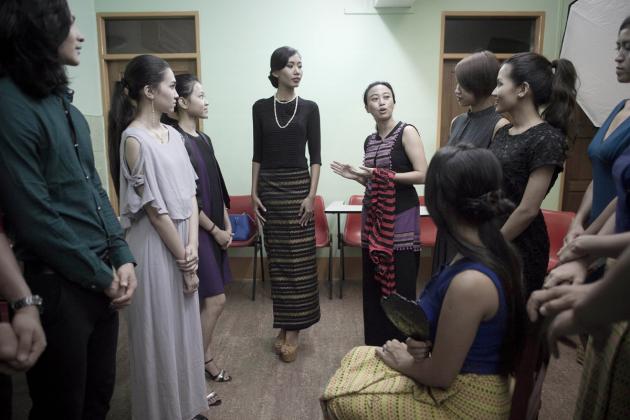Mastering manners

In search of fame and fortune at Myanmar's finishing schools
Knees pressed together and sitting bolt upright, Myanmar students watch a demonstration on personal grooming, the latest batch at a Yangon finishing school chasing dreams of celebrity and success.
A small but rapidly growing middle class in the once-cloistered nation is seizing the chance to master western manners after decades of military rule ended in 2011.
The shifting cultural scene comes as Myanmar braces for perhaps its most dramatic transformation of all with next month’s polls seen as a key test of the country’s transition towards democracy.
For the girls studying etiquette inside a smart high-rise flat in northwest Yangon, the lure is mostly a chance to enter beauty pageants banned under the former junta whose clinch on society smothered all forms of expression.
“We have to know how to walk properly, about posture and how to fold our legs (when sitting) so they don’t look short,” Su Myat Nilar, an aspiring actress, told the class in Burmese.
She’s one of the latest to join Style Plus H, a personal grooming school that launched the same year nearly half a century of junta rule gave way to a quasi-civilian government.
It targets the rush of young people clamouring for a foot into the pageant, modelling or acting industries as global pop culture takes grip in the once pariah nation.
Classes have blossomed since 2013 when Myanmar fielded its first Miss Universe contestant, a US-educated business graduate, to represent the country in more than 50 years.
But this small school is also catering to aspirational parents eager to give their children the best chance in a fast urbanising society.
“When we were young we didn’t need this. But now Myanmar is booming,” says founder Hla Nu Tun after training her class of 10, including two boys, in wardrobe management, lift etiquette and gestures she deems fit for the global stage.
It’s preparation for the foreigners who arrive and “look for people who can work with them”, added the English-teacher-cum-entrepreneur in a British accent honed from studies and telesales in London.
As Myanmar opens its long-sealed economy to foreign firms, demand is surging for nationals with the language and skills to ease their entry.
It’s providing a niche for personality development schools such as John Robert Powers, a franchise of the US brand that in March opened its first branch in Yangon, the 15th in Asia.
“Myanmar needs to catch up with other countries in the region,” says school director Alexey Naumov, saying their courses offered a chance to “polish” communication skills.
Businesses have been among the first to sign up – the company has already trained staff at flag carrier Myanmar National Airlines and some local hotels as firms try to better cater to the record numbers of foreign tourists now visiting the country.
But the Russian director admits they’re “struggling to explain” exactly what personality development means to Asia’s newest middle class and so far reaches affluent families whose children are headed for studies overseas.
Though hemlines are rising, Buddhist-majority Myanmar remains a deeply conservative nation.
Most of the women walking past the billboards now advertising foreign fashion and make-up brands still wear traditional floor-length “longyi” and smear cream thanaka paste on their cheeks.
Recent photographs of Miss Universe wannabees wearing scantier adaptations of the national dress sparked outrage on social media with accusations the |styles were vulgar and unsuited to Myanmar.
Others question why a nation with its own graces and growing sub-cultures needs to follow a prescriptive pattern of decorum.
Tin Moe Lwin, an early etiquette pioneer when the country was still in the junta’s steely grip, says the opening economy has led to a surge in demand for western-style manners but with a local twist.
Her Talents and Models Agency, initially focused on the entertainment industry, is increasingly targeting new businesses and families with disposable incomes.
Currently she is training 600 mostly rural nurses in communication skills for a new private hospital under construction in Yangon as “customers are changing”.
Most worked in village clinics with no hospital experience, says the seasoned trainer, explaining she starts with simple healthcare concepts before imparting “very basic western manners” in Burmese.
For the 45-year-old, who has taught everyone from teens to generals, the new wave of classes are not a replacement of traditional Burmese values but a chance to understand international norms spanning handshakes to queues.
“When we were young the impression of Myanmar people (lining up) at airport immigration was different to others... I want us to be (seen) at an equal standard,” she said.
RELATED





